Women Grievance Cell
As an innovative practice, the Institution has established Women’s Grievance Cell with the objectives of redressing the grievances of the students and the staff, of any sort related to women. In 1997, the Supreme Court in Vishakha and others vs. State of Rajasthan, recognised and addressed the issue of sexual harassment at the workplace. The judgement created mandatory sexual harassment prevention guidelines for the workplace, applicable all over India. The knowledge and information about it can lead to a workplace free of sexual harassment for all persons.Sexual harassment injects the most demeaning sexual stereotypes into the general work environment and always represents an intentional assault on a person’s innermost privacy.
- In compliance with the directions of the Supreme Court of India to have a special Sexual Harassment Committee as mandatory, the Women’s Grievance Cell also functions as Sexual Harassment Committee.
- It provides confidential and supportive environment for members of the campus community who might likely have been sexually harassed; advises complainant of the informal and formal means of redressal; ensures the fair and timely redressal of sexual harassment complaints. (However so far no instances of sexual harassment have been reported)
- It provides information regarding counselling and support services on the campus, and promotes awareness about sexual harassment through educational initiatives that encourages and fosters a respectful and safe campus environment.
What is Sexual Harassment?
According the Supreme Court Order, sexual harassment is any unwelcome:
- Physical contact and advances,
- Demand or request for sexual favour
- Sexually coloured remarks
- Display of pornography
- Any other unwelcome physical, verbal and non-verbal conduct of a sexual nature.
- Basically it is any unwelcome words or actions of sexual nature.
Examples :
- Denial of payment or official approval in the absence of sexual favours
- Pornographic pictures/messages displayed on desks or sent by email
- Remarks made about personal appearance and dress
- Coloured jokes shared in the office that make others present feel uncomfortable.
Functions of the Cell :
To provide a neutral, confidential and supportive environment for members of the campus community who may have been sexually harassed;
- To advice complainants of the informal and formal means of resolution as specified by the Cell;
- To ensure the fair and timely resolution of sexual harassment complaints;
- To provide information regarding counselling and support services on the campus;
- To ensure that students, faculty and staff are provided with current and comprehensive materials on sexual harassment and assault;
- To promote awareness about sexual harassment through educational initiatives that encourages and fosters a respectful and safe campus environment.
The Cell seeks to inform the campus community of their right to a respectful work and learning environment. It believes that if we practice respect, exercise empathy in our interactions with others so that we do not hurt anyone through what we say or do then we can create a campus that is free of sexual harassment. Simple respect for all on the campus community is thus the focus.
The Cell seeks to achieve
- Awareness Through Dissemination of Information – through production, distribution and circulation of printed materials, posters and handouts
- Awareness Through Workshops – about sexual harassment for faculty, non-teaching staff and students. The aim is to develop non-threatening and non-intimidating atmosphere of mutual learning.
- Awareness by Counseling – Confidential counseling service is an important service as it provides a safe space to speak about the incident and how it has affected the victim because sexual harassment cases are rarely reported as it is being a sensitive issue.
Working modality of the Cell:
- The complainant will have to submit a written and signed complaint addressed to the Secretary of the Cell.
- The counselor will call the complainant for a personal meeting, usually within a week from the submission of the written complaint.
- The members of the Cell will discuss the complaint.
- If the case falls outside the purview of the Cell, the complainant will be informed about the same by the appropriate authority.
- If the case comes under the purview of the Cell, an enquiry committee will be set up. The Committee will submit a report and recommend the nature of action to be taken at the earliest by the appropriate authority.
Current Members of the Cell:
As per guidelines given in Vishakha Judgment and according to the State Govt. directions,Dayanand College of Law has duly constituted Women Grievance Cell.
Following are the members of the Cell.
| Name | Designation |
| Dr. P P Nathani | Chairman, In-charge Principal |
| Dr. S A Mahajan | Presiding Officer |
| Dr. G G Panchal | Member (Teacher’s Representative) |
| Dr. S D Panchal | Member (Teacher’s Representative) |
| Mrs. Kumudini Bhargav | Member (NGO) |
| Sri. D P Alandkar | Member (Non-teaching Representative) |
| Sri. M S Bajpai | Member (Non-teaching Representative) |
| Miss. Priyanka Deshpande | Member (Student Representative) |
| Miss Urmila Dharashive | Member (Student Representative) |
| Mr. Aatish Tiwari | Member (Student Representative) |
International Women’s Day Programme 8-3-2023
On account of International Women’s Day i.e. 8 March 2023 a programme was arranged by Women Studies Centre and Internal Complaint Committee of Dayanand College of Law, Latur. Resource person Dr Padmavati Biyani Toshniwal, MBBS , DNB ( Gynaecology), Superspecialization in Fetal medicine ( Pondicherry and Mumbai ), Founder and CEO of first dedicated fetal medicine centre of Marathwada-Latur Fetal Medicine Centre delivered a talk on “Women Empowerment”.



Awareness Programme on Prevention of Sexual Harassment 21 July 2022
Internal Complaint Committee of Dayanand Shikshan Sanstha’s Dayanand College Law organized a program to create awareness among college students about “Prevention of Sexual Harassment of Women at Work Place Act 2013”. Nagpur High Court advocate Padma Chandekar was invited for this event. At this time, she informed about all the actions that come under the definition of sexual harassment. It also guided how to file a complaint with the Internal Grievance Redressal Committee without keeping silent if a student is being sexually harassed. While giving information about the internal grievance, redressal committee members and procedures, she also said that the need to establish this committee from the colleges also because the legal concept of sexual harassment came forward in India in 1997 in Bhavari Devi case. She asserted the need to create respect for women and girls through direct action to prevent incidents of sexual harassment and if everyone fulfills the responsibility of creating a dignified and healthy environment for women and girls, women will work boldly without any discrimination or pressure.


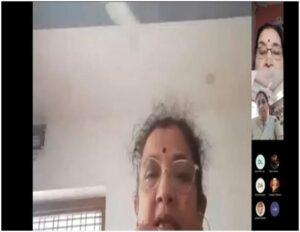
International Women’s Day Programme 8-3-2022
On account of International Women’s Day i.e. 8 March 2022 a programme was arranged by Women Studies Centre and Internal Complaint Committee of Dayanand College of Law, Latur. Resource person Dr. Preeti Pohekar, Prof. & Head, Dept. of Public Administration, Rajarshi Shahu College (Autonomous), Latur delivered a talk on “Prashaskiya Mahila Adhikari v Sakshamikaranachi Disha”

National Webinar on “Prevention of Sexual Harassment” 11th May 2021
Women Grievance Cell and Women Studies Centre of Dayanand College of Law, Latur organized a National Webinar on “Prevention of Sexual Harassment” on 11th May 2021 at 10.30 a.m. through Microsoft Teams App to aware about Prevention of Sexual Harassment specially for all first year students. Mrs. Tejashree Damame, Clinical Psychologist and a Practicing Counselor, Pune (Ankuram, Feats of Wonder) was the Chief Guest for the webinar. She explained the Prevention of Sexual Harassment Act thoroughly and punishments under the law. Majority of the students attended the webinar.

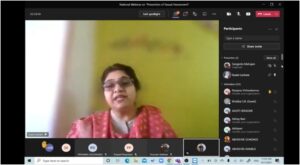
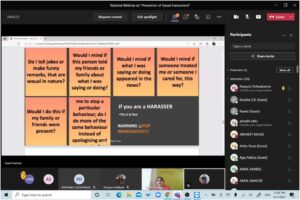
International Women’s Day Programme 8-3-2021
Dayanand College of Law, Latur celebrated International Women Day Programme on 8th March every year. This year also, the day celebrated by organizing a webinar on “Domestic Violence in Present Era”. Dr. Anjali Joshi, Professor and Head, Department of Sociology, Dayanand College of Arts, Latur was the speaker for the webinar. In her session she elaborated and presented statistical data about how domestic violence is increasing due to Covid 19 pandemic situation. programme was arranged by Women Grievance Cell, Women’s Study Centre and NSS department of our College.





International Women’s Day Programme 12-3-2020
Dayanand College of Law, Latur celebrated International Women Day Programme on 8th March every year. This year also, the day celebrated by inviting Adv. Jayashri Patil, Alumni of our college and President, Educrest CBSE English School, Latur to deliver a lecture on “Skills of Advocacy” and also organized a street play by singing a powada on account of International Tobacco Control programme.
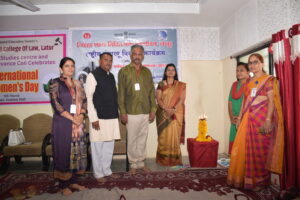
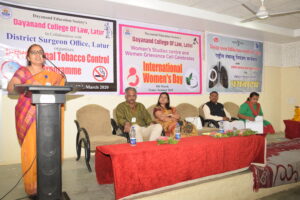
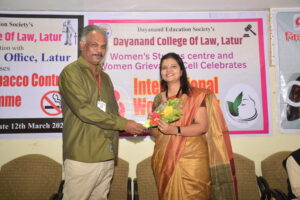
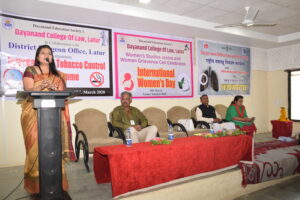
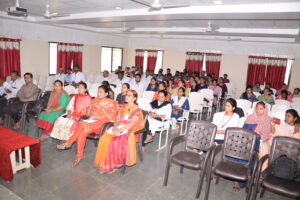
International Women’s Day Programmes 8-3-2019
International Women day celebrated in Dayanand College of Law, Latur on 8 March 2019 in the presence of Mrs. Madhavi Maske, PSI, Reader SDPO Office, Latur and Dr. Prachi Devashish Ruikar, Gynecologist, Mamta Hospital, Latur. Mrs. Madhavi Maske guided on ‘Crime against women and Cyber Crime’ to college students. On this occasion free Medical Check-up Camp was organised for girl students.
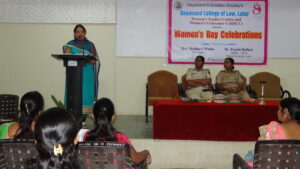
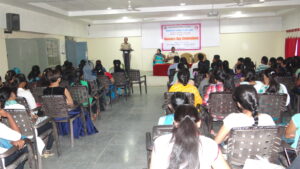
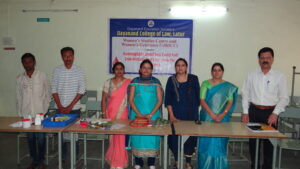
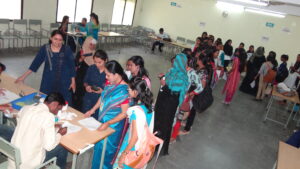

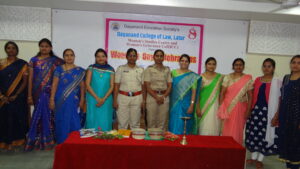
International Women’s Day Programmes 8-3-2017
International Women day celebrated in Dayanand College of Law, Latur on 8 March 2017 in the presence of Prof. Nayan Rajmane, a famous poetaster, Latur. She elaborated the present situation of women in society through her poems i.e. “Ti sadhya kay krte”, “Band darvaja” and “Shik pori shik”. She also sensitized on to grant women rights and to stop dowry and give her inheretence rights to empower economically. A economically empower women can develop her own as well as family and society.
[Best_Wordpress_Gallery id=”263″ gal_title=”women-grievance-4″]
Workshop on “Sexual Harassment of Women at Workplace (Prevention, Prohibition and Redressal) Act, 2013”
Dayanand College of Law, Latur organised a workshop on “Sexual Harassment of Women at Workplace (Prevention, Prohibition and Redressal) Act, 2013” for college students on 27 Feb.2017 to make aware about the act and its sections and punishment under the act. Adv. Vishal Dixit from Latur was the resource person for the workshop. During his session he thoroughly explained how to file a complaint, the mechanism of women grievance cell and support to aggrieved women.
[Best_Wordpress_Gallery id=”264″ gal_title=”women-grievance-5″]
Online Portal for Complaint
